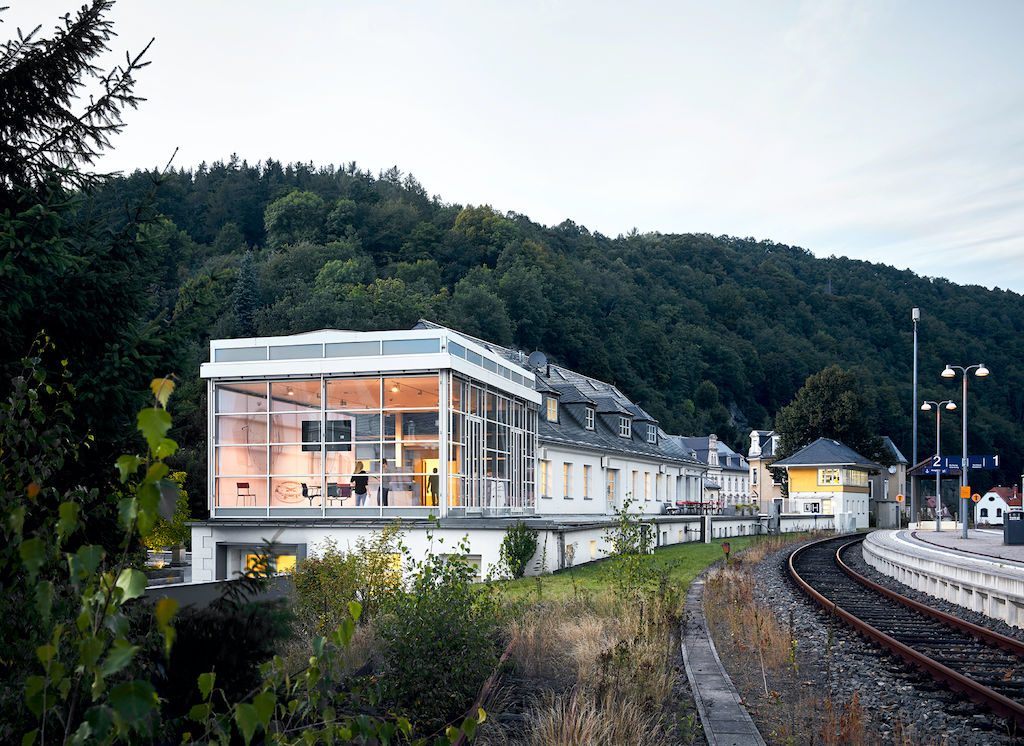Judith Borowski has been part of the senior management team at NOMOS Glashütte for 17 years. Under her direction the company has become internationally renowned for watchmaking and much more, namely its response to issues such as radicalism and intolerance. She first explained why political debate also belongs in the office in the Handelsblatt newspaper—and you can read the German article here.
Financial aid packages, furloughs, needing to wear face masks in public: The Corona pandemic isn’t the only time that politics has been a source of discussion and controversy; politics is ever-present in our company. And that begs the question: Are we in favor of that—at work? Of course we are.
This was posed to over 1,000 people in employment in a recent survey by YouGov Germany. The result: Only 30 percent of workers in Germany talk about politics at work, while 44 percent find it “inappropriate” to do so. The trend is growing for the latter group; in this regard every second person in work admits to having become markedly more reticent over the last five years. That could be down to management and the companies themselves. Since what's to be gained if employee A stops speaking to employee B because of a difference in political leanings? Wouldn’t colleagues be better off sticking to spreadsheets, schedules, and negotiations?
Not entirely, no. Because all of us—including businesses, management, and employees—should participate. Preferably free of bias when it comes to the colors of our chosen political party, and yet with complete conviction when it comes to our freedom, our democracy, the allocation of resources, and many more important issues: Where does the meat in the canteen come from, what does a fair policy for business trips look like, is there equality across the board, how do our suppliers act for the environment and society, and who the reduction in sales tax is going to help? The health of the economy depends not least upon the policies and approach of the government—whether at local, regional, or state level.

We should participate—preferably free of bias, much like the screwdrivers used by the watchmakers of NOMOS Glashütte. Their colors represent blade sizes, not political parties.
To be clear: It's none of our business how employees vote. Yet it should make managers happy to see their staff thinking politically and exercising their rights. Because people who think critically and who are engaged make for better, more modern, more motivated workers. In eastern Germany, where our company is based, it’s always been the case: Politics in the workplace is perceived a little differently in comparison to other regions—it's a more delicate subject here than elsewhere, as there are numerous sensitive issues still left over from the former GDR regime. But anyone who has lived through various political systems or has learned about them at home at the dinner table knows that freedom and opportunity are worth so much.
The benefit of having lived through more
There’s more to eastern Germany today than the hollow cries of nationalism; there is also the distinct benefit of having lived through more and different political systems. There are also many people who welcome a little bit of West Germany in the East, as well as the liberty, tolerance, responsibility, and freedom of speech that have thrived here for 30 years—and that politics has changed the way a typical working day goes.
Seeing a “deeper meaning” in what you do and where you do it is, of course, something that not only executives think is important, but also all those who, on the floors down from the C-suite, work just as hard and often even harder. Recognizing that the company you work for holds a certain conviction is fundamental to many people. Especially today, as the line between work and leisure becomes blurred, and some have had to reveal their interior design preferences while using Zoom for business meetings. If you want to participate and think critically, you have to be able to feel somewhat at home in the company, like you’re in the right place. And to be confident that you can express yourself freely.

NOMOS watches also represent conviction. The case back of this special edition model for the 70th anniversary of the German constitution is engraved with the words of Article 1: “Die Würde des Menschen ist unantastbar” (the dignity of man is inviolable).
And yet one thing is clear: Too much debate in the workplace is a distraction, democracy often just isn’t suited for business, and it’s by no means always possible. On the other hand, important decisions are often made better through collective intelligence, when more people are included in the process; these decisions are more thought out, more widely endorsed, followed through, and lasting. Perhaps it depends entirely, undogmatically, on the topic in question.
For our company, however, more politics doesn’t entail 100% compulsory participation in decision-making, nor does it mean party politics and rowdy debates will take over the lunch hall—it’s simply thinking in terms of the whole. To see the employee as a political animal, as Aristotle called it, is a great thing: A social being, one designed to function as part of a group. That is something cultural and not hostile to business. Quite the contrary.
Only when the general consensus is disregarded, when freedom of speech is exercised at the expense of minorities, for example, those in charge should put a stop to it. It’s an appropriate moment to show a little backbone, you could say. Otherwise: Though often contentious, the fact that others think differently is to be welcomed, because this is the only way we can gain insight. I know what I believe, and have done for a long time. Perspectives from elsewhere—that is, those in the minds of others—can always broaden your horizons that little bit more. Even those of managers who are already supposedly very well-informed.

Before Corona, face masks and Zoom: Judith Borowski discusses new watches with NOMOS designers.
The German business newspaper Handelsblatt published this guest op-ed piece on 18.08.2020.
PUBLICATION: October 2020
TEXT: Judith Borowski
IMAGES: 1. NOMOS Glashütte/MERK & MARK, 2. NOMOS Glashütte/Benjakon, 3. NOMOS Glashütte, 4. NOMOS Glashütte/Hartmut Nägele



